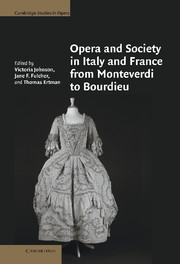Book contents
- Frontmatter
- Contents
- List of illustrations
- List of tables
- List of musical examples
- Notes on contributors
- Foreword
- Acknowledgments
- Introduction: Opera and the academic turns
- I The Representation of Social and Political Relations in Operatic Works
- Introduction to Part I
- 1 Venice's mythic empires: Truth and verisimilitude in Venetian opera
- 2 Lully's on-stage societies
- 3 Representations of le peuple in French opera, 1673–1764
- 4 Women's roles in Meyerbeer's operas: How Italian heroines are reflected in French grand opera
- 5 The effect of a bomb in the hall: The French “opera of ideas” and its cultural role in the 1920s
- II The Institutional Bases for the Production and Reception of Opera
- III Theorizing Opera and the Social
- Bibliography
- Index
3 - Representations of le peuple in French opera, 1673–1764
Published online by Cambridge University Press: 22 September 2009
- Frontmatter
- Contents
- List of illustrations
- List of tables
- List of musical examples
- Notes on contributors
- Foreword
- Acknowledgments
- Introduction: Opera and the academic turns
- I The Representation of Social and Political Relations in Operatic Works
- Introduction to Part I
- 1 Venice's mythic empires: Truth and verisimilitude in Venetian opera
- 2 Lully's on-stage societies
- 3 Representations of le peuple in French opera, 1673–1764
- 4 Women's roles in Meyerbeer's operas: How Italian heroines are reflected in French grand opera
- 5 The effect of a bomb in the hall: The French “opera of ideas” and its cultural role in the 1920s
- II The Institutional Bases for the Production and Reception of Opera
- III Theorizing Opera and the Social
- Bibliography
- Index
Summary
I would like at the outset to call into question a widespread idea. It is generally believed that French opera embodied the aristocratic ideology of the court, and that this ideology was challenged in the last third of the eighteenth century. This is not completely accurate. A purely ideological approach has difficulty accounting for many operatic details, and it is particularly unsuited to explaining the way in which le peuple (by which I mean “ordinary people”) are shown on the stage in French ancien régime opera. This is the topic I will address here – representations of the people on the stage of the Académie Royale de Musique between 1673 and 1764 – and I will do so using a strictly literary framework.
The topic itself presents a paradox: due to the specific aesthetic and literary nature of French opera in the classical period, it is difficult to imagine how le peuple would have a role to play within it. Indeed, the operas of this period are grounded in an aesthetic of exemplarity and heroic themes. Moreover, in these works, the problems of the city and politics more generally play a secondary role. However, as I will show, the populace is nonetheless consistently present. Furthermore, I will argue that this presence is introduced for specific poetic reasons that arise from a general rule which, at one and the same time, links and opposes theatre and opera in this period.
- Type
- Chapter
- Information
- Publisher: Cambridge University PressPrint publication year: 2007
- 2
- Cited by



